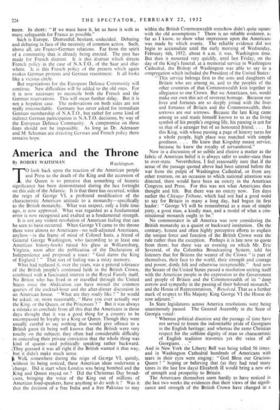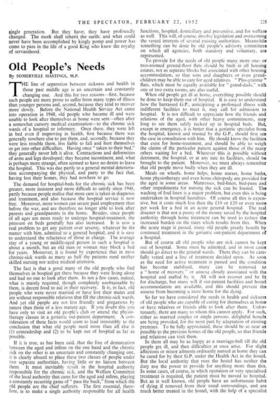America and the Throne
TO look back upon the reaction of the American people and Press to the death of the King and- the accession of the Queen is to perceive that something of historic significance has been demonstrated during the last fortnight on this side of the Atlantic. It is that there has occurred, within the reign of George VI, a profound modification of the characteristic American attitude to a monarchy—specifically to the British monarchy. What was suspect, only a little time ago, is now approved. What was regarded as a fundamental error is now recognised and exalted as a fundamental strength.
It is not any violent revolution of American feeling that can be seen to have occurred. When George VI came to the throne there were almost no Americans—no -well-adjusted Americans, anyhow—in the frame of mind of Colonel Innis, a friend of General George Washington, who (according to at least one American history-book) raised his glass at Williamsburg, Virginia, soon after the publication of the Declaration of Independence and proposed a toast: " God damn the King of England ! " That sort of feeling was a misty memory.
What had replaced it, over the years, was a general tolerance of the British people's continued faith in the British Crown, combined with a fascinated interest in the Royal Family itself. No Briton who has lived in or travelled through the United States since the Abdication .can have missed the common queries of the cocktail-hour and the after-dinner discussion in an American house. " What are they really like ? " he would be asked; or, more reasonably, "Have you ever actually met the King, or the Queen, or the Princesses ? " But it was always a mistake_to conclude from all this that the Americans in those days thought that it was a good thing for a country to be encompassed by loyalty to a King or Queen. Though they were usually careful to say nothing that would give offence to a British guest (it being well known that the British were very touchy on the subject), they often had considerable difficulty in concealing their private conviction that the whole thing was kind of quaint—and politically speaking rather backward. !They guessed it was all right if the British wanted it that way, but it didn't make much sense.
It Well, somewhere during the reign of George VI, quietly, without its being noticed, these American ideas underwent a !change. Did it start when London was being bombed and the King and Queen stayed on ? Did the Christmas Day broad- casts, bringing the voice of the King out of millions, of American loud-speakers, have anything to do with it ? Was it that the decision of a free India and a free Pakistan to stay within the British Commonwealth somehow didn't quite square with the old assumptions ? There is no reliable evidence, as far as I know, to show what impression upon the Americans was made by which events. The reliable evidence did not begin to accumulate until the early morning of Wednesday, February 6th, 1952; about 6 a.m. it was, Washington time. But then it mounted very quickly, until last Friday, on the day of the King's funeral, at a memorial service in Washington Cathedral, the Bishop of Washington was able to say to a congregation which included the President of the United States : " This service belongs first to the sons and daughters of Britain who are among us, and to the peoples of the other countries of that Commonwealth knit together in allegiance to one Crown. But we Americans, too, would make our own this act of reverent homage. Because our lives and fortunes are so deeply joined with the lives and fortunes of Britain and the Commonwealth, their sorrows are our sorrows. Because the late King came among us and made himself known to us as the living symbol of his people's ongoing life, his passing is not for us that of a stranger but of an honoured friend. . . In this King, with whose passing a page of history turns for a whole people, high place was matched with simple goodness. . . He knew that Kingship meant service, because he knew the royalty of servanthood."
Now in a discussion of so subtle and elusive a matter as the fabric of American belief it is always safer to under-state than to over-state. Nevertheless, I feel reasonably sure that if the sense of the passage quoted above had been uttered before the war from the pulpit of Washington Cathedral, or from any other rostrum, on an occasion to which national attention was directed, there would have been an outcry in the American Congress and Press. For this was not what Americans then thought and felt. But there was no outcry now. Ten days earlier the Chicago Tribune, which had not had a good word to say for Britain in many a long day, had begun its first leader: " George VI will be remembered as a man of simple piety, a good man, a kindly man, and a model of what a con- stitutional monarch ought to be."
No commentator in all America was now considering the British monarchy as a quaint or backward institution. On the contrary, honest and often highly perceptive efforts to explain the unique force and function of the British Crown were the rule rather than the exception. Perhaps it is late now to quote from them; but there was an evening on which Mr. Eric Severeid, of the Columbia Broadcasting System, told his listeners that for Britons the wearer of the Crown " is part of themselves, their face to the world, their strength and courage and power, dimly felt and otherwise inexpressible." And now the Senate of the United States passed a resolution uniting itself with the American people in the expression to the Government and people of Britain and the Commonwealth of its " deep sorrow and sympathy in the passing of their beloved monarch," and the House of Representatives, "Resolved, That as a further mark of respect to His Majesty King George VI the House do now adjourn."
In State legislatures across America resolutions were being unanimously passed. The General Assembly in the State of Georgia voted: " Whereas political disunion and the passage of time have not served to lessen the indomitable pride- of Georgians in the English heritage; and whereas the same Christian respect for the sublime dignity of man so characteristic of English tradition traverses yet the veins of all Georgians. . . ."
And in New York the Liberty Bell was being tolled 56 times: and in Washington Cathedral hundreds of Americans with tears in their eyes were singing : " God. Bless our Gracious Queen ! " hoping or believing that (as they, had read many times in the last few days) Elizabeth II would bring a new era of strength and prosperity to Britain. The Americans themselves seem hardly to have noticed in the last two weeks the evidences that their views of the signifi- cance and strength of the British Crown have changed in a qingIe generation. But they have; they have profoundly changed. The meek shall inherit the earth: and what could never have been accomplished by kingly pomp and power has come to pass in the life of a good King who knew the royalty of servanthood.



































 Previous page
Previous page